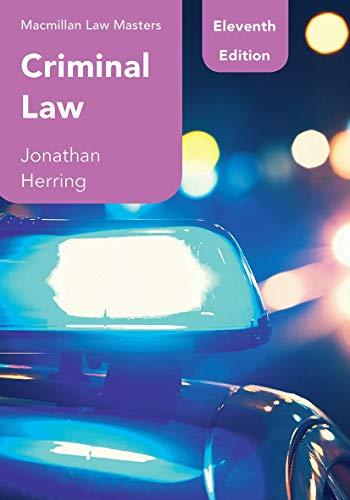Question
Richard, an impoverished university student, and his millionaire father enter into an arrangement where Richard agrees that he will keep the front- and backyards of
Richard, an impoverished university student, and his millionaire father enter into an
arrangement where Richard agrees that he will keep the front- and backyards of the
family property mowed, and he will 'do bit' to keep the gardens looking tidy. In return,
his father agrees to pay him a weekly allowance of $200. His father had previously used a
garden contractor to do the job and paid him $350. They live on a one-hectare property,
and the mowing alone takes half a day a week. After four weeks, Richard's father tells him
that he can't afford to pay $200 a week. He says that Richard should be doing the work
for nothing, as it is the responsibility of the whole family to look after the property;
besides, he says, Richard is getting free board and lodging. Advise Richard.
Question 102 Is the use of sublingual captopril 25 mg/h, in combination with IV furosemide 40 mg/h to a maximum of 120 mg, safe to lower greatly elevated blood pressure? Question 103 Is ACEI superior to calcium channel blockers in the treatment of hypertension, in terms of prognosis and of the prevention of complications? Question 104 Are angiotensin-converting enzyme (ACE) inhibitors more effective than beta-blockers in reducing the risk of stroke in hypertensive patients? Question 105 Do non-steroidal anti-inflammatory drugs (NSAIDs) affect the antihypertensive effect of angiotensin-converting enzyme (ACE) inhibitors? If so, how? Question 106 What antihypertensive is recommended for a patient with aortic stenosis (AS) and hypertension, as a mono- and combination therapy? Question 107 Impotence is a common side-effect of antihypertensive drugs. How can I solve this problem in young hypertensive patients? Question 108 In the treatment of hypertension, is it recommended to commence treatment with two drugs containing a thiazide (if elderly) or a beta blocker (if young)? Question 109 1. Following a stroke, both haemorrhagic and ischaemic, in previously hypertensive and normotensive patients, can you explain precise blood pressure control and the desired blood pressure levels? 2. In the case of a hypertensive emergency, with a blood pressure of 220/130 with acute myocardial infarction, what immediate measures should be taken? Question 110 On lowering blood pressure, to what extent can heart failure secondary to chronic hypertensive heart disease be reversible? Question 111 Is the use of amlodipine or furosemide recommended to normalize blood pressure in a case of hypertensive heart failure? If so, which is most effective? Question 112 How can diabetes cause endothelial dysfunction? What are the roles of ACE inhibitors in the kinin-kallikrein system? What are the mechanisms by which a decrease in the level of nitric oxide causes endothelial dysfunction?
Step by Step Solution
There are 3 Steps involved in it
Step: 1

Get Instant Access to Expert-Tailored Solutions
See step-by-step solutions with expert insights and AI powered tools for academic success
Step: 2

Step: 3

Ace Your Homework with AI
Get the answers you need in no time with our AI-driven, step-by-step assistance
Get Started


